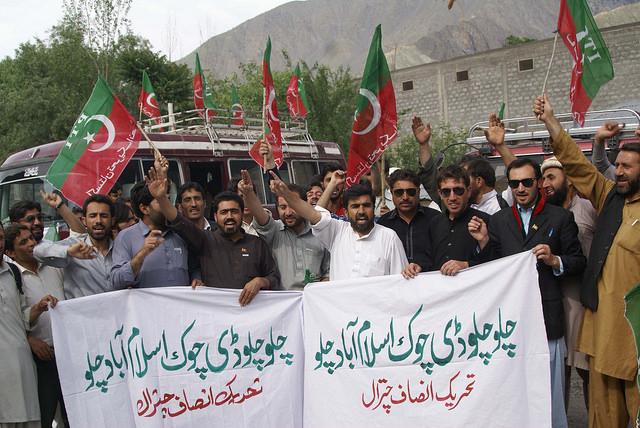 This year’s Independence Day on 14 August in Pakistan marked the start of political protests against the government of Prime Minister Nawaz Sharif. Now into their third week, protests have become violent in recent days with questions being raised about Pakistan’s political stability. Will this political agitation succeed in changing the political landscape in Pakistan? And will this provide Pakistan and its region with greater stability and change for the better?
This year’s Independence Day on 14 August in Pakistan marked the start of political protests against the government of Prime Minister Nawaz Sharif. Now into their third week, protests have become violent in recent days with questions being raised about Pakistan’s political stability. Will this political agitation succeed in changing the political landscape in Pakistan? And will this provide Pakistan and its region with greater stability and change for the better?
The protestors comprise two groups. Leading one group is former cricketer and Pakistan Tehreek e Insaf party (PTI) leader Imran Khan who has led a ‘freedom’ march from Lahore to Islamabad and has continued to push the notion that the Sharif government has been elected illegitimately, with a supposed 70,000 votes missing from each constituency. Leading the other is cleric and Sufi Scholar Muhammad Tahir-ul-Qadri who called his own ‘revolt’ march on behalf of his party, Pakistani Awami Tehreek (PAT). His group is calling for less corruption in government and disallowing ‘corrupt members’ from standing for election.
Whilst protests have been disruptive, they aren’t expected to amount to much. Reports have suggested that since the outset, the protest has peaked at about 40,000 members, hardly enough to sway any incumbent Prime Minister. It’s difficult to see how this action is in the strategic interests of Khan and his party. Accusing the current government of lacking full democratic legitimacy, the PTI has demanded the resignation of the Prime Minister, instead of taking the case to the courts or waiting to display dissatisfaction in the polls. That unwillingness suggests Khan is unable to prove beyond speculation that Sharif’s government was obtained through anything other than legitimate means.
The underwhelming protest continued with Khan’s self-proclaimed ‘game changing announcement’. On 17 August, Khan called for a movement of nationwide civil disobedience, via the refusal of all citizens to pay taxes to the state and to stop paying utility bills. Those are both weak and almost meaningless threats. Less than 2% of Pakistanis pay tax—with little coercion or oversight from government bodies. Furthermore, the call for an end to utility payments would be ineffectual: Pakistan is a country that experiences heavy daily load shedding and electricity and gas suppliers don’t hesitate to remove access if payments aren’t met.
If the protests continue, it’s hard to see who the real winners are. If successful, the protests’ delegitimising of the government through violence would undermine the democratic structure of the institutions that any Prime Minister would then inherit—a concept that seems lost on Khan and Qadri. On the other hand, if the violence is stamped down by the army and the action fails, it will ultimately highlight a fact that has plagued Pakistani democratic process for as long as the nation has existed—that ultimately, the military controls the fate of Pakistan. Sharif will remain in power, but faith in civilian government will be further eroded and Pakistan will be the only victim.
Pakistan’s politics have a history of geographic division, which is the case for the two parties in question (the PTI from Peshawar and the PTA, Karachi). That highlights a problem that has existed in Pakistani politics since its earliest beginnings as a nation: Pakistanis are not united by their sovereignty, and therefore, not by their government. Author of Pakistan, a hard country, Anatol Leiven, encapsulates this idea perfectly:
If I were to jump on a box and preach revolution with the best programme in the world, do you know what would happen? First, people from the other provinces would say that we can’t follow him, he’s a Punjabi, other Punjabis would say, we can’t follow him, he is a Jat…..If you preach Islamic revolution, we Pakistanis can’t unite behind a revolution because we can’t unite behind anything.
Sharif still holds popular support in the parliament and, having recently engaged militants in rebel strongholds in North Waziristan, continues to lead a Pakistan that acts as a regional springboard for the US drawdown—a vital advantage for a stable Afghanistan. Should Pakistan’s political scene change, the US might have to court a new partner.
On the eastern front, Sharif has been a strong advocate for normalising relations with newly-elected Indian Prime Minister, Narendra Modi—a vital process when considering historical tensions between the two nuclear states. If Australia continues to pursue uranium trade with India, stable relations with Pakistan will make that trade less political and therefore simpler. If Indo-Pak relations are returned to the military, it would be a devastating loss for South Asia and the Asia Pacific.
Pakistan still boasts a laundry list of problems that need solving before genuine progress can be made in a meaningful way. Sharif may not be the answer to those problems. However a ranting, pop star cricketer with little political weight, and a mostly Canadian megalomaniac, turning an elected government out through violence is a step far out of reach of anything resembling progress.
Elliot McBride is an analyst at the South Asian Strategic Stability Institute, Islamabad. Image courtesy of Flickr user Ground Report.